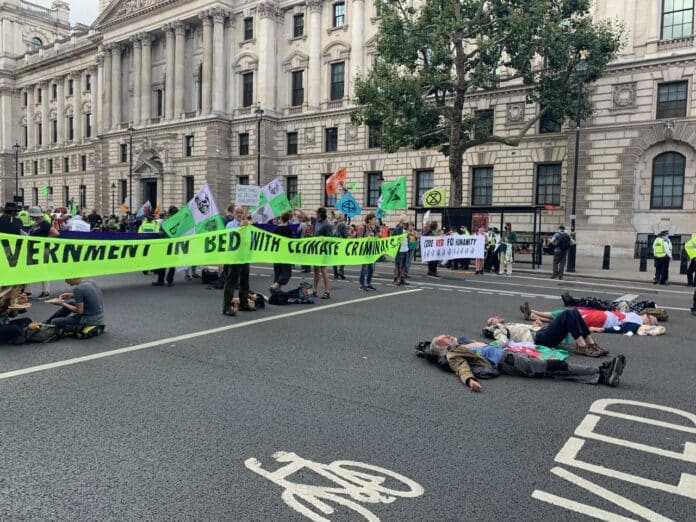The conundrum of climate change is a longstanding one, most of us are all aware of the effects it has on our lives and consequent damage to the planet in terms of global heating and rising sea levels. Recently in the UK a political group has emerged called Insulate Britain and their civil disruption methods are forcing the debate to a point it’s never been.
Their methods of protest are extreme and has attracted criticism from mainstream media. Who these people are? What do they want? Are their methods effective? Are their demands realistic?
Who are these people?
Insulate Britain is a radical protest group set up in July 2021 in the UK but began its controversial protesting methods in early September.
It was created by former members of the climate protest group Extinction Rebellion and many of its current members still have connections with activists from the more established group.
Whilst it has no official leader, the ‘ring leader’ of the group, Liam Norton, 36, has made many passionate public appearances on television and Radio stations, a lot of which have gone viral.
In one interview he admitted that there “was a consequence in disruption” following a week of criticism after the revelation that his own home was not insulated.
Their civil disobedience protests by his team of activists, which number around 150, have been arrested a massive 690 times since protests began with the majority of those arrested being older members of the climate protest group.
Why are their methods so extreme?
Insulate Britain methods mostly consist of the blocking of major roads including the M1, M25 and the M20, which blocked freight from Dover adding to the already empty shelves in the UK.
The roads are blocked with members of the group, who also hold banners and glue themselves to the roads. These extreme methods have been met with angry and physical responses by the public, which could potentially develop into a worse situation.
Transport for London (TFL) was successfully granted a high court injunction against Insulate Britain, preventing them from protesting at 14 locations. A spokesman for TFL said “this will help to protect London’s Road network and everybody using it”.
However, their methods have successfully got them into the spotlight and UK Prime-Minister Boris Johnson told the Mail on Sunday he considered their actions “reckless and selfish” against “people trying to go about their lives”.
But does this play into Insulate Britain’s hands? They have made over £50,000 out of their £80,000 target in donations on their website, with 11 days remaining it seems they’ll achieve their target.
The debate caused by their divisive protest actions gives Insulate Britain a platform to share their objectives, which generate both followers and antagonists alike.
A member of Insulate Britain, former police officer Tony, 71, said they were “forced to do something substantial” to make the government listen.
What do they want?
Insulate Britain has two main objectives on their website:
Firstly that “the UK government promises to fully fund and take responsibility for the insulation of all social housing in Britain by 2025”.
Secondly that “the UK government immediately promises to produce within four months a national plan to fund and take responsibility for the full low-energy and low-carbon whole-house retrofit of all homes in Britain by 2030”.
Insulate Britain sees it as imperative that all homes within the UK have insulation. The tactics employed by insulate Britain are to force the government to make a commitment over insulated homes.
This is due to the current state of the UK housing, which remains one of the worst in Europe with 10,000 people dying each year from fuel poverty and millions more facing harsh physical and mental health living conditions.
In June, the UK Committee on Climate Change stated there has been “minimal progress” in recent years on progressing the insulation of buildings or converting to low-carbon heating.
This is something Insulate Britain are aiming to change as many climate and policy expects consider insulated housing as “low hanging fruit” in the journey for reducing UK emissions.
Is it achievable?
Whilst the way in which Insulate Britain protests its demands polarises support, is what they’re asking really that extraordinary.
Jess Ralston, an analyst at the Energy and Climate Intelligence Unit said that “their methods may be disruptive, but experts inside and outside of government have repeatedly agreed with their messages and called for a plan to sort out our poorly performing homes over the last decade”.
A study conducted by Energy Efficiency Infrastructure in 2017 found that the starting cost of investing and improving the UK housing stock would be significantly exceeded by the financial and social advantages that come with it.
The government’s own climate advisors, the Climate Change Committee, released a progress report on reducing emissions. They found that improving emissions and insulting homes must be an urgent priority for the government to hit its 2030 target and stay within legal targets.
It seems Insulate Britain are here to stay, whilst universally their actions have been condemned, the evidence suggests the cause they’re fighting for is achievable and expected of the UK. Whilst there tactics have successfully reignited the debate, there is a increased risk of generating public anger over their civil disobedience.
If you like our content please keep us going for as little as £2 a month https://dorseteye.com/donate/







